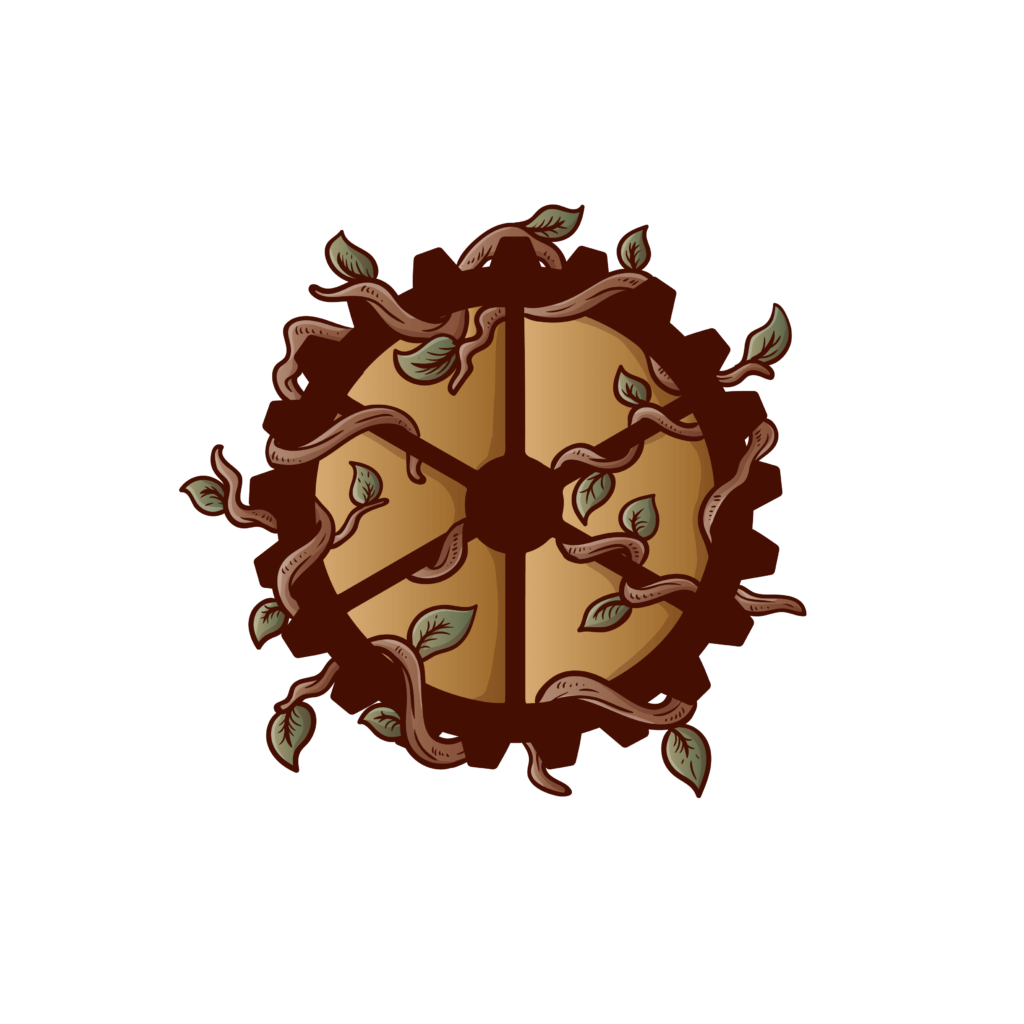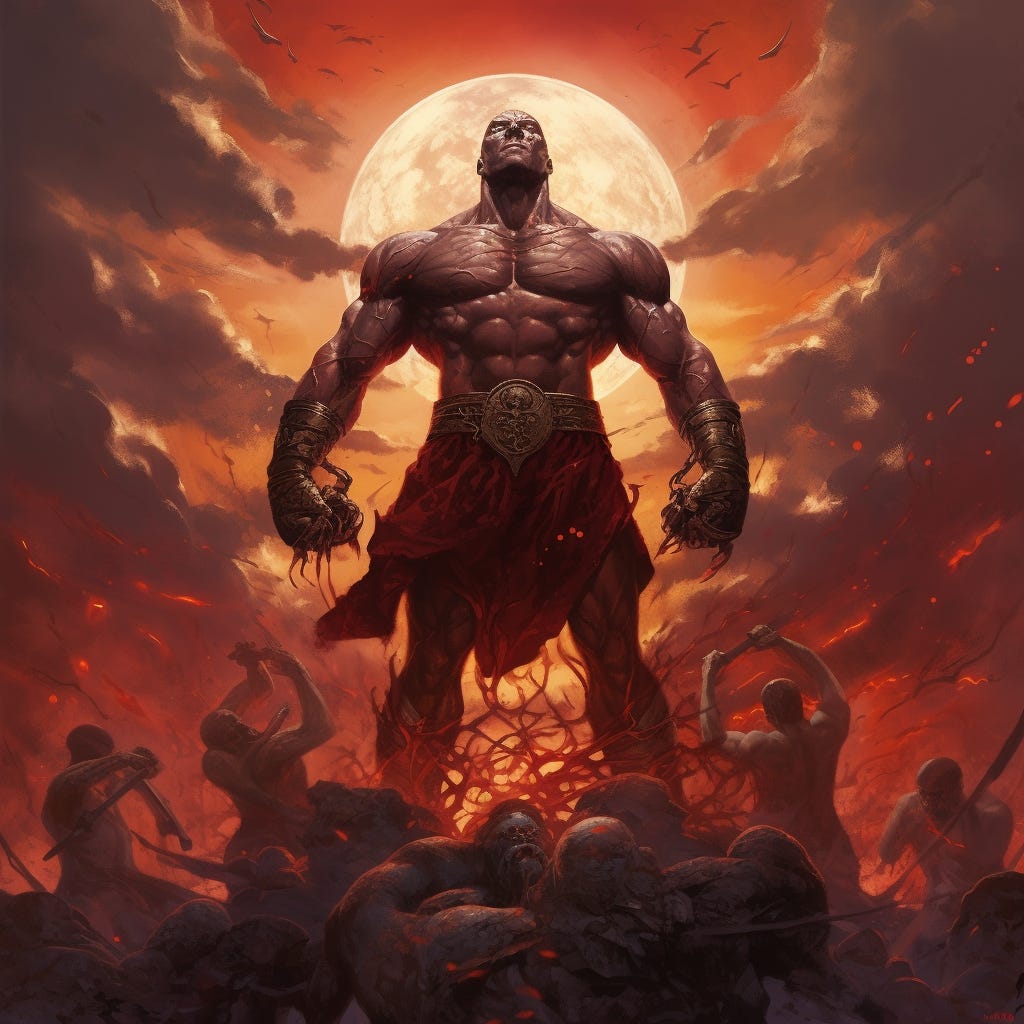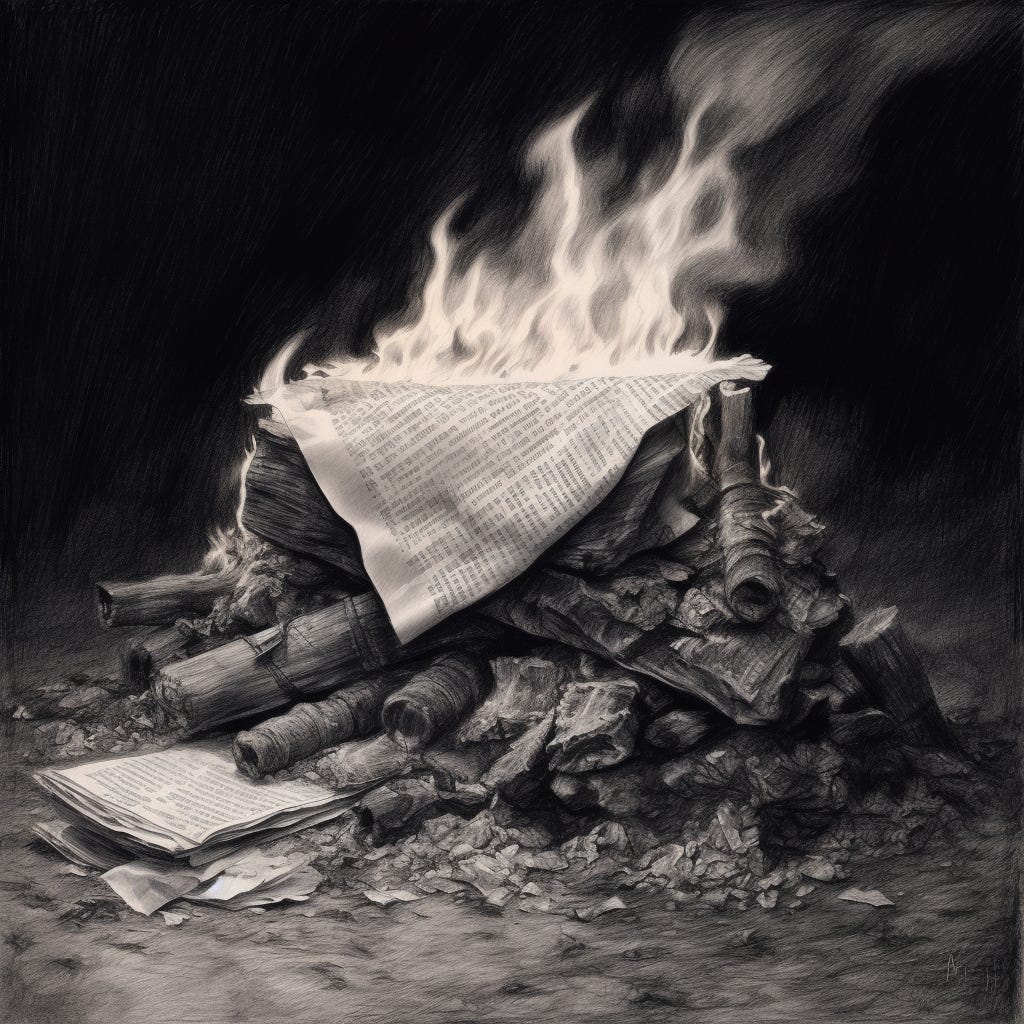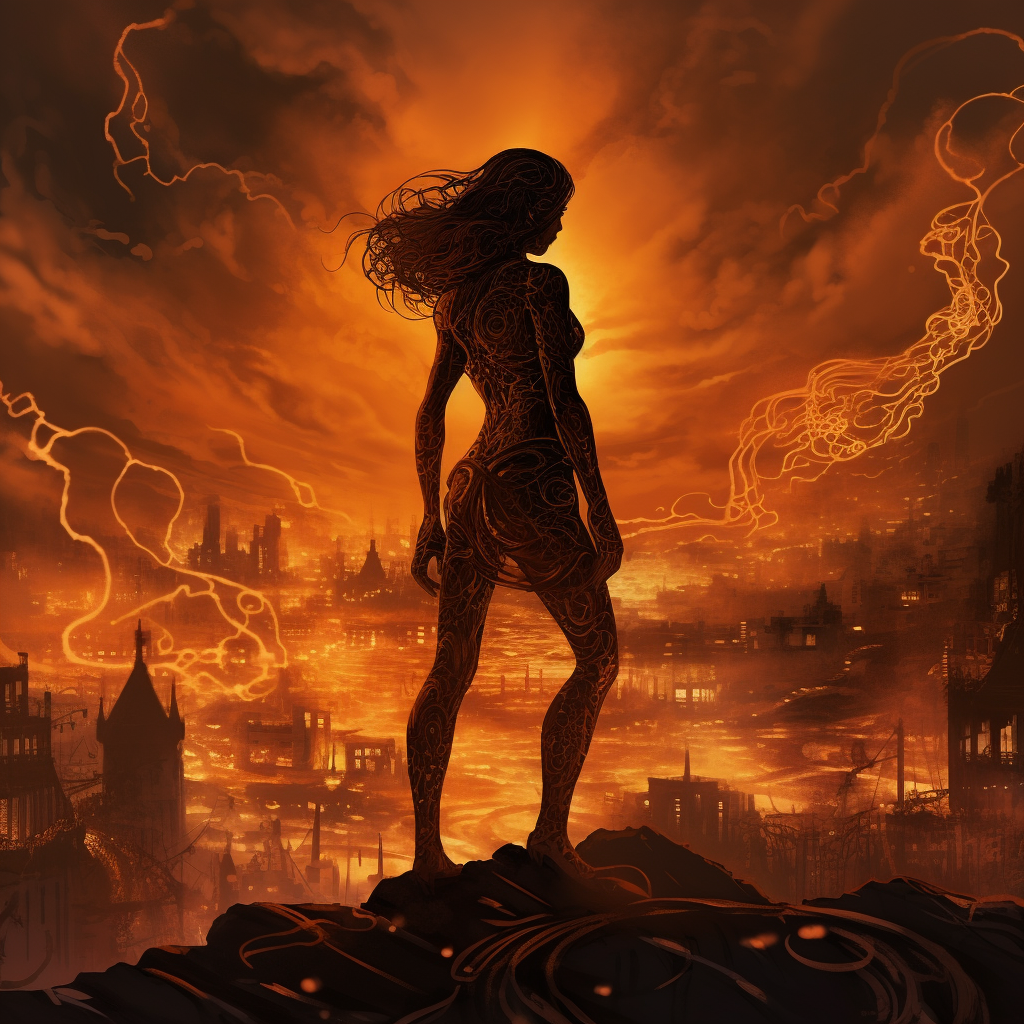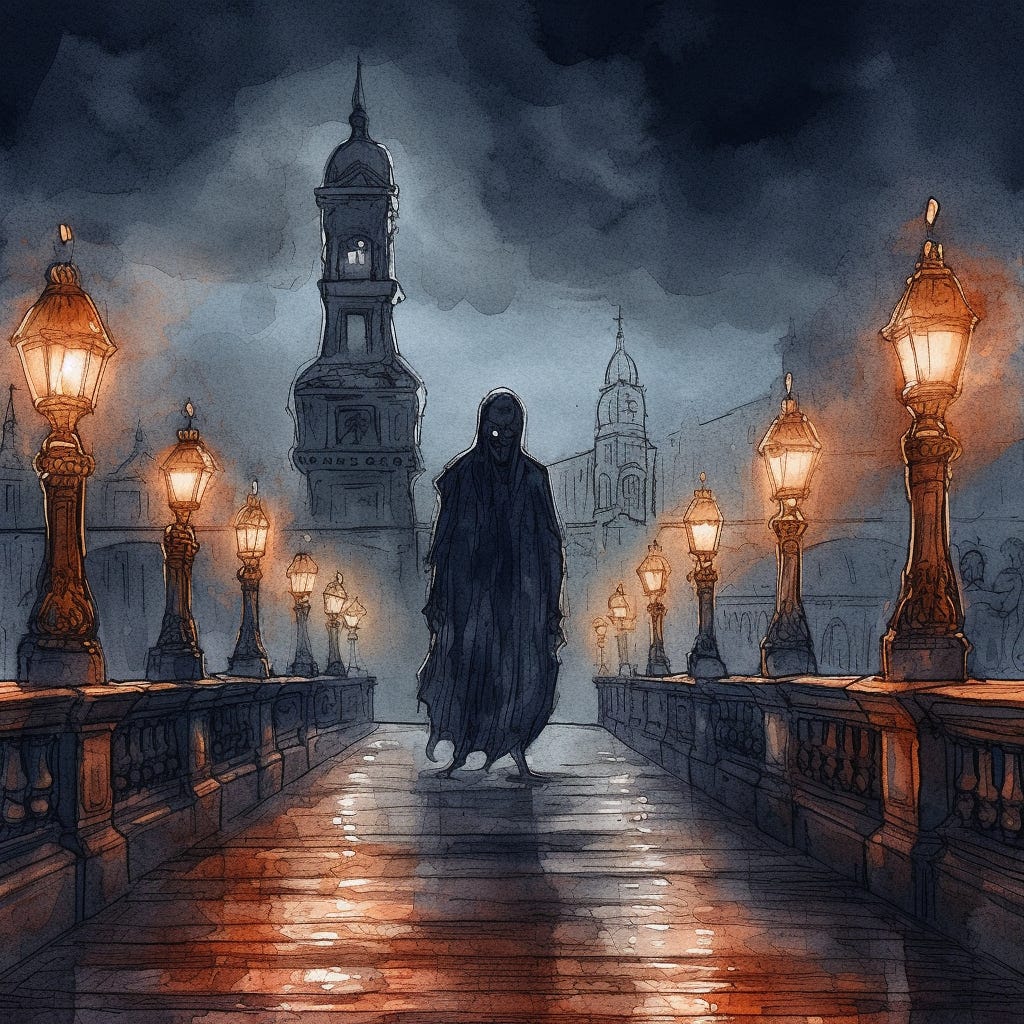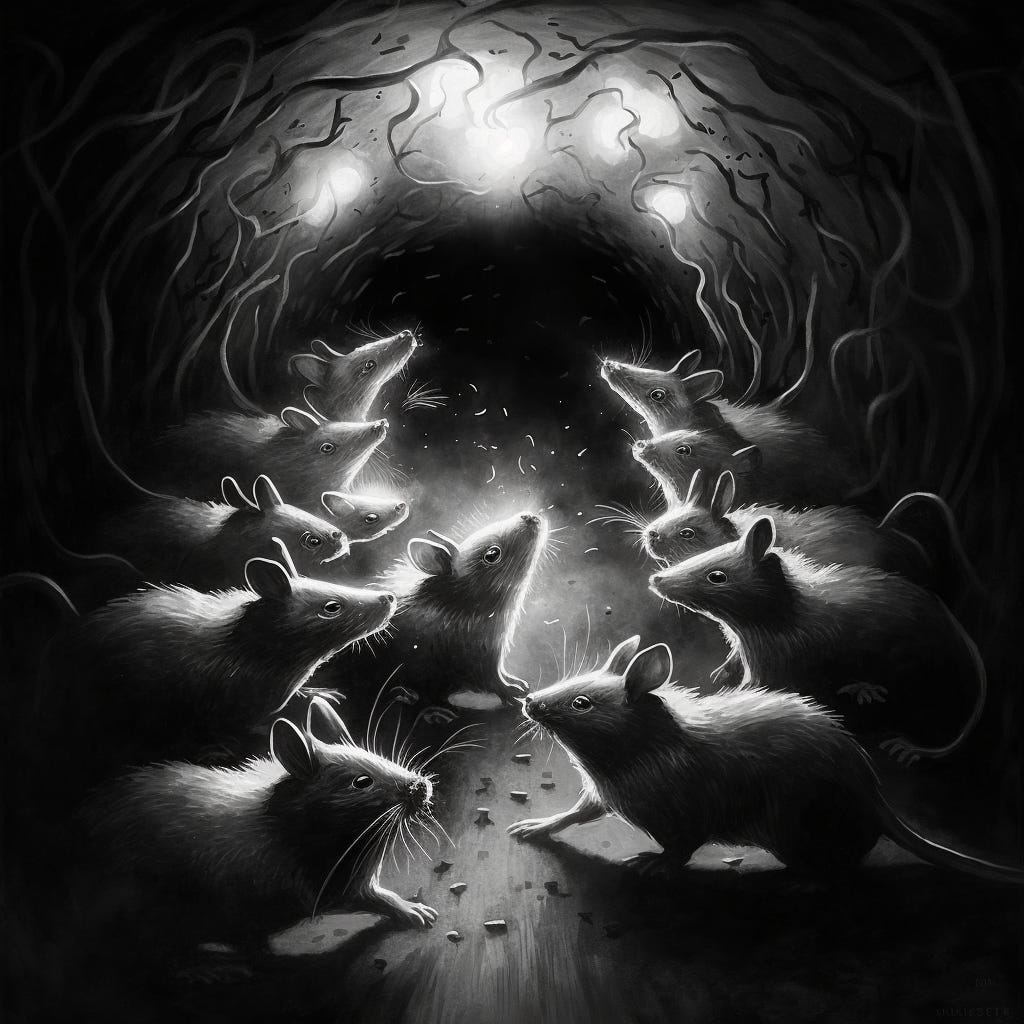The Legend of the Vagabond Prince
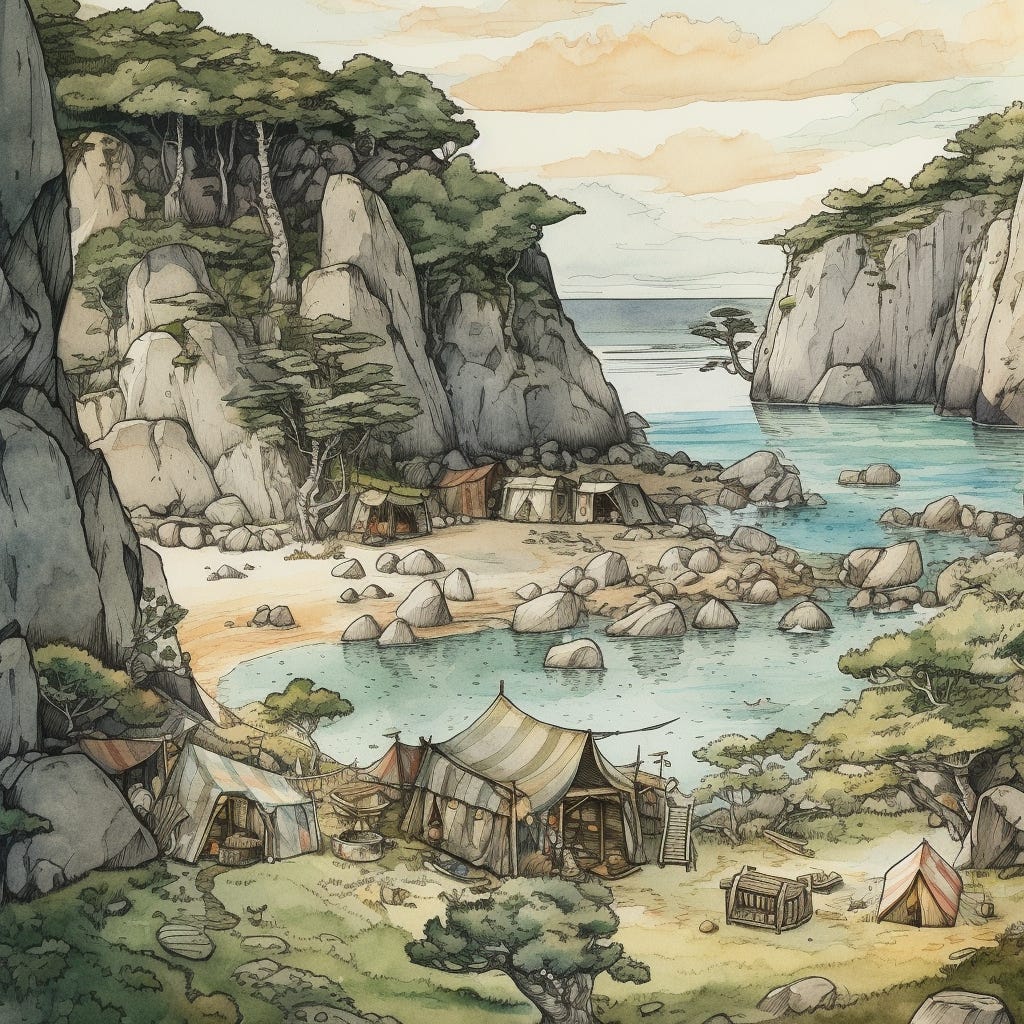
This legend was shared at an unsanctioned side event at the 51st Conclave of Bards by the popular historian Lerman Garindis upon the publication of his much-debated monograph, Secrets of the Stonelayer: Theories and Legends Surrounding the Founding of Amalcross.
Neither rain nor clouds accompanied the great sadness welling in his chest — only the dry air of the desert. He dug with bare hands into the scorching sand. Others from the caravan offered their help, but he denied them. He said it was his responsibility alone, so he dug into the sand with the people of the caravan watching him.
With a heaviness in his heart, Cogidubnus laid his wife and child down in the hole. A simple wooden marker, roughly carved with a misshapen bird atop it, was stabbed into the sand where they laid. He had tried to fix it so many times. Other wooden markers lay around him with the same bird carved atop them, each misshapen and lopsided, some snapped in two from frustration. His hands were red and burnt, covered with dried blood and small cuts from the knife. With a howl, he threw one of the markers into the expanse of sand and scrubland then fell to his knees before the grave.
He lingered there, slumped onto his knees with his hands lying limply in his lap, as the caravan broke camp and trundled past him. There were no horses to be found in these harsh deserts, so the caravanners traveled light and pulled their own wagons. As the last one creaked past him and the shallow, sandy grave, Cogidubnus gripped the rough and splintering handle of his own wagon and pulled it along, the newly replaced wheel carving a straight path alongside the wobbly rut of the other. If he had replaced it sooner, the spoke never would have broken, and Felidey wouldn’t have fallen and gone into labor sooner than she should have. He had rushed to start that morning, not wanting to fall behind in the trek. And now? He trailed after the rest like an afterthought, for this was not Cogidubnus the Stonelayer, First and Only King of Amal. He was not a leader, yet.
He was merely a man bereft of his family.
The way through the Sand Wastes was hard and not to be taken lightly. The only thing that kept the caravan moving forward was the promise of more prosperous lands where they could settle and build a home and community. This was why Cogidubnus had joined the group, and why he had convinced Felidey to accompany him. She had protested at first, wanting the child to be born at home and not on the road. He’d assured her they would reach the green lands long before she gave birth. She acquiesced, for she too saw the dream of a better life in a land of plenty.
They had both known the way would not be easy, but they dreamed of raising their child amidst peace and bounty.
With his loss weighing on him, Cogidubnus found it difficult to continue. Many times he fell behind, dropping the handle from his blistered hands. More than once he yearned to collapse and let the sands take him. He imagined himself dropping and never standing again as the winds blew the sands over him, eroding his skin and bones until he disappeared and became one with the desert itself.
But we know Cogidubnus pulled himself through the sands, despite the heartache and loss, for if he had laid down and let the sands take him, this city would not stand around us today.
Assuredly, he faced many hardships on the winding journey through the Sand Wastes. Others died along the way, and those they left behind were soon consumed by searing heat, biting sand, and wild animals in the night. Yet now, whenever the caravan faltered, Cogidubnus pulled his companions out of their despair as best he could and pushed them onward. He took a permanent spot at the rear to keep an eye on the stragglers and would let no one fall behind him as they moved.
One such individual he helped was an unnamed chronicler within the group who recorded the travels of the caravan. There is not much left of their entries, but they do speak on how Cogidubnus picked them up from the sands and pulled both their wagons along. He overcame the first trial as all great people of legend must, even pulling others through it along with him, but this would not be the last, nor is it the end of his heartache.
For a time, after arriving in the land that would one day be our home, he was able to ignore his sorrow. He threw himself into his work here and began to build alongside the people of his caravan as well as others who had come from far off places. Tents went up in a rough perimeter, and workers began spreading out from the encampment to cut lumber, pull stones from the earth, and till the land. Before long, the landscape was dotted with stacks of lumber and piles of uncarved stone. They used these as markers for work sites as well as to demarcate the boundaries of the new city that was slowly rising.
Cogidubnus was still not yet a leader, but his reputation grew with time. He worked alongside the others, breaking and pulling stones, felling trees, laying the foundation for a small village. He laughed and found a kind of peace with them and in the work they did. As in the Sand Wastes, he seemed to naturally find his role as a caretaker and made sure anyone within the encampment had what they needed. There were times he went without to do so, forgoing his own dinner that others might eat.
But tragedy continued to plague him. Whispers sprouted of a haunted man who’d brought bad luck upon the entire budding settlement. Some believed Cogidubnus to be the reason for the losses and sorrows along the road — and even within the embryonic settlement.
Indeed, they were not wrong. Something had crawled its way from the Sand Wastes to follow Cogidubnus and destroy everything he sought to build, anything that brought him joy or comfort from his heartache. It was a reminder of what he had already sacrificed. The people spoke of a shadowy figure with spindly limbs and glowing-ember eyes moving through the camp like a nightmare made manifest.
Where Cogidubnus worked, the shadow would follow. It haunted his steps and watched him. At first he did not see it, railing instead against the superstitions of those around him: Without the dangers of the journey, the people now conjured fake ones in their dreams!
One night, however, Cogidubnus lingered later than the other workers amongst the stones. He measured and cut the stones with care, smoothing their edges, finding solace in the work and comfort in the weight of his hammer and chisel. As he studied his work, something just on the edge of his vision caught his attention. Was someone in the shadows beyond the cast of his lantern?
“Who goes there in the shadows?” Cogidubnus called out. “Come to help me finish the wall’s foundation, friend?”
But this was no friend. The figure approached, its movement slow, languid, and unnatural. When the light shone across it, he saw it was not even human. Its visage was strange — that of a person with stretched features and eyes sunken but blazing with a cold white light. Its frame was long and pole-thin and covered in undulating shadows that clung to it like dark robes. A dark spidery hand reached toward Cogidubnus, and a single word croaked out of the thing as if even that seemed to tear its throat raw.
“Murderer….”
The word hung between the builder and the Uncanny Being. The air grew thick and cold. Ice seemed to form around Cogidubnus’s heart, and his breath caught.
“I understand you not, friend.”
The air around the thing grew even darker, the shadows themselves deepening. A burbling, croaking noise came from its throat, as if its voice had been drowned in its own dark blood. Then it screeched and stood suddenly before Cogidubnus. It touched one of its spindly fingers draped in shadow and ichor to Cogidubnus’s chest.
“You left me to rot, and now our corpses cook beneath the scorching sands. You buried your sin and came here to forget, but I shall not allow it. I shall destroy everything you care so much for!”
Its voice cracked and broke as it yelled and became more and more distorted with each word.
Cogidubnus’s wife and child were dead, buried in the Sand Wastes beneath the simple woodcarving of a bird. He had dug the hole himself with his bare hands. He had the callouses and burns to prove it. This monstrosity was either an abomination from the realms of Chaos or a hallucination.
He closed his eyes and opened them once more. Still, it stood before him. He swallowed thick saliva. It was lying, attempting to fool him, preying upon his guilt. When his breath returned to him, so too did a newly kindled rage burn within him.
“No,” Cogidubnus declared.
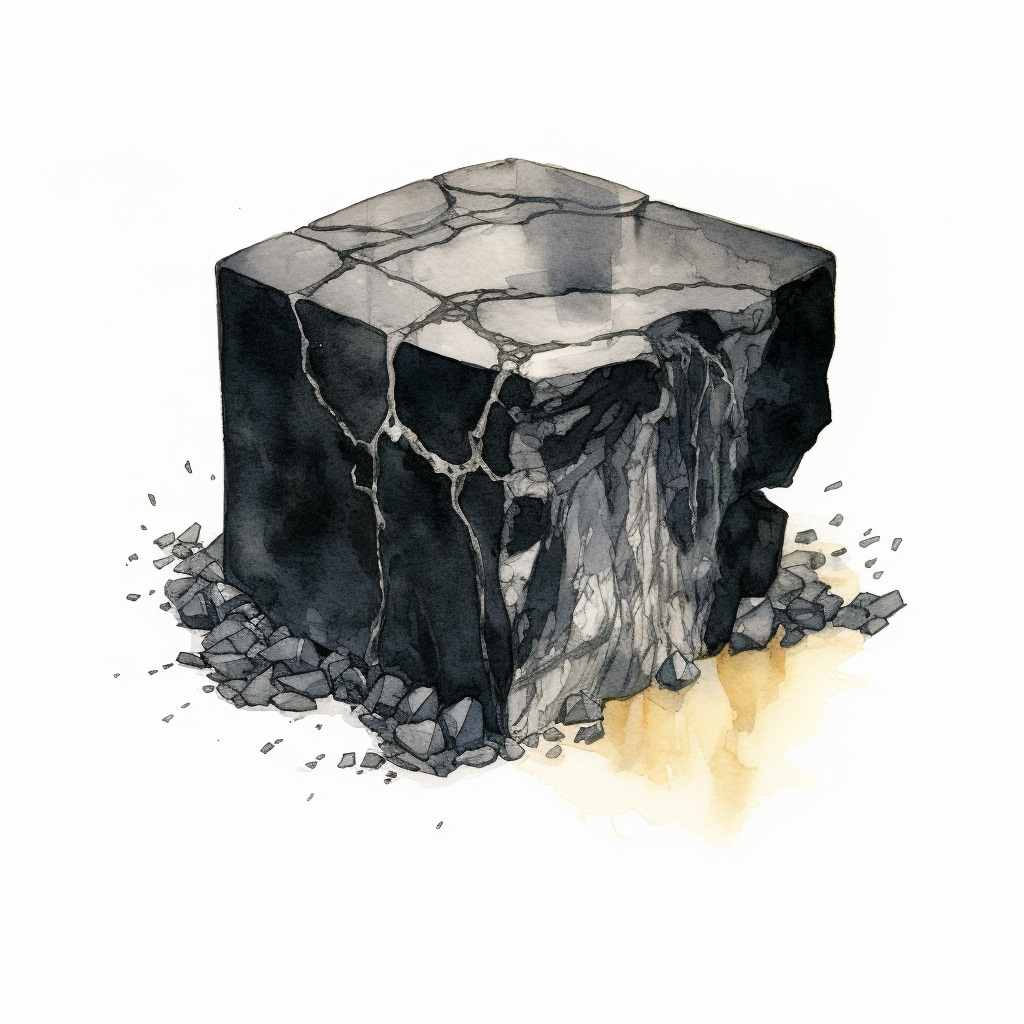
With that word, the air rippled and something broke — something invisible to the eye of a man. Something deep and unknowable. The figure cocked its head at an unnatural angle then disappeared, leaving Cogidubnus with his stones and tools. He was drenched in cold sweat. He fell to his knees there and shook from a chill he could not shake.
The chill was still with him the next morning. It was as if the thing’s inky black hand gripped his heart and refused to let go.
At the quarry, Cogidubnus’s materials were ruined. The lumber stacked nearby had rotted, somehow aging and decaying overnight. The stone was crumbled and chipped. What had happened? Was this the work of that shadow from the night before? This would set the settlers’ progress back, but not by much. The other work sites were intact, unharmed.
Rumors travel like fire in the small settlements, so before long everyone knew about the shade haunting Cogidubnus. And now Cogidubnus himself could no longer say it was superstition and anxiety from his fellow settlers. Instead, he said nothing at all about his encounter and he redoubled his efforts.
For a year, materials and supplies around the encampment rotted away overnight. The destruction seemed to follow in Cogidubnus’s footsteps. It began slowly and only Cogidubnus’s efforts. But then the decay expanded to encompass everything: Stones carved from the hillsides crumbled to dust, lumber from the great forest splintered with blight, and even freshly mined ore rusted and chipped before it could be refined.
The settlers saw that their promised land was cursed. With their eyes turning toward Cogidubnus, they said someone in the camp must have brought that curse with them.
⚙︎⚙︎⚙︎
Cogidubnus persisted with his work, endlessly carving and laying stones in the dead of night so he would not force his presence on those who did not want it. As he hewed the rock, he could sense the shadowy figure watching him. Some nights he would return to his work and find it had been tampered with or destroyed — joints broken, stones toppled over, wooden beams shattered — and so he would begin again. On and on this went like some warped child’s prank.
In this isolation and cycle, he met Javendra.
One night, whilst working through one of the many piles of stone, Javendra watched him from a distance. She saw the care he took in smoothing and polishing each stone as he chipped away with his hammer and chisel. She would have been content to simply watch him work, but this night Cogidubnus’s hand trembled and slipped, and the chisel sliced across the palm of his hand. Though blood flowed freely, he continued to work, not even stopping to wrap the wound. He had not even reacted to the slice across his palm, as though he didn’t even feel it or care that it had happened. The wooden handle of his hammer was quickly stained red from his bleeding hand.
Javendra left the shadows and walked to the stone pile. She stepped up to him and slapped the tools from his grip. Without so much as a word she bound his hand with a piece of cloth torn from her dress hem. As she did so, he finally snapped out of whatever trance he had been in.
“Thank you,” he said before reaching for his tools again.
She stepped between him and the fallen tools and said, “You’re done working for the night.”
He began to resist. “But I need to—”
“Rest,” she said. “Come.”
She led him away from the work site and the bloodstained tools on the ground.
In time, the two grew close with and fond of one another. Cogidubnus had believed he would never love another person since the death of his wife. His heart opened once more, and light returned to his life. Soon Javendra was with child, and Cogidubnus saw — perhaps — another chance to have a family and a warm home.
But though she brought light, a darkness hung over Javendra and she fell very ill. The child, a girl, came early.
Cogidubnus saw the dark figure slinking through the shadows that day. When it slipped through the flaps of the tent, the oil lamps flickered and their flames guttered. He stepped toward the shadow, grabbing a chisel from the table. An exaggerated smile stretched across the being’s face as it simply passed through Cogidubnus. His breath caught, and his limbs froze.
The shadow reached its hand out and softly touched its finger to the newborn’s forehead. All the warmth and color drained from her skin into the shadow’s fingertip. When the being withdrew its hand, the babe was a pale and sickly little thing. Yet, she held onto life.
The dark being slunk away. In its wake it begat a sickness upon the encampment. Dark splotches formed across the bodies of many of the settlers, and disease spread quickly. Many became so ill they could not work; others succumbed, coughing up blood as great boils grew upon them.
Cogidubnus’s newborn daughter, Kelindey, developed dark splotches across her body, and he did what he could to care for her, bathing her in the cooling waters of the Strait and feeding her warm milk. The illness spread further, and Cogidubnus felt he would lose yet another from his life. He sat awake through the hours of the night, barely conscious from exhaustion, and prayed to whatever god would listen and spare his child’s life.
One night, when the child did nothing but cough and wail, Cogidubnus was visited by another strange spirit. This one, however, was not malevolent.
He felt her presence as a warm spring breeze. A soft blue glow emanated from within his small shack, and he covered his eyes more from the shock of it than the actual intensity. There stood a woman with long curly hair. She looked at him with sadness in her eyes.
Cogidubnus spoke her name softly, less of a question and more of a plea.
“Yes, Cogi, it’s me.”
Her voice — Fediley’s voice — was soft. Tears formed at the corners of his eyes. His heartache, buried deep but not forgotten, was pulled to the surface.
“I’m sorry. It’s my fault.”
His voice caught in his throat as the tears ran into his beard. The spirit of his wife glided forward and placed a hand on his cheek.
“We both sought a better home for our family, but our son has been twisted into something else.”
“That thing—”
“Is our son,” Fediley said. “He is captured by strange forces of both life and death, a power beyond the Meridian from the realms of Chaos. They took hold of him at birth. He neither lived nor died fully in this world, so he is caught in between. And he blames you for our deaths.”
“I deserve his hatred.” Cogidubnus gave a great sigh and fell into a chair.
“These people don’t. This child,” she said as she caressed the babe, “your child does not deserve his hatred. He aims to destroy all you attempt to build. Our people will continue to suffer unless you drive him out.”
“I’m no hunter. I can’t stop him. I’m just a builder.”
“Then build, Cogidubnus,” Fediley said. “There are ancient spells, bindings that can shackle Uncanny Beings like him and banish them back to the realms of Chaos. I saw the binding glyphs as I passed from your world to the next. In your dreams you shall see them too. Build the foundation of your great city in the formations of these bindings, and you will seal our son beneath it.”
⚙︎⚙︎⚙︎
Cogidubnus awoke with a start, almost toppling from his chair. The shack was empty save for him and his daughter. The sunlight streamed through the open window. There was no sign of Fediley, but the design for a great city had taken root in his mind.
He tossed aside his chisels and hammers and rolled a blank sheet of parchment out on the table. With the formation of ancient bindings and the layout of the future city fresh in his head, he began sketching in earnest. The foundation, the roads, drainage ditches, walls, and cellars of Amalcross — the very bones of the city — would need to be laid precisely and in the correct order. If they were, the Uncanny thing, his son, could not destroy the city as he so desired. If they laid the stones according to the ancient bindings, his son would be trapped, sealed away beneath the city. The being would be powerless, so long as Cogidubnus could ensure he was present within the boundaries of the city at the time he laid the final stone. He glanced at the sleeping form of his daughter. A bitter taste rose in his mouth as he thought of the task that lay ahead, but he knew how to lure his son within the binding.
With many in the settlement unable to work from the illness, Cogidubnus gathered those who could and showed them his blueprints. Cogidubnus unrolled the blueprint on a sawdust-covered workbench in the middle of a worksite enclosed by the wooden skeletons of buildings.
By this point, most believed him to be the reason for all the strife and suffering that befell them; he knew what the whispers said about him. A man named Drej was the loudest amongst them. The group of workers gave him the courtesy of at least looking over the blueprints. Drej was the last to look, and he studied the plans for a long moment before spitting upon them. He wiped the spittle across the plans, smearing the ink, and sneered.
“Why should we follow your plans at all?” Drej said. “The work required would be tremendous and would take at least two of our cranes away from other sites. And, with you around this much equipment, people are likely to die in the process.”
The others in the work group murmured agreement.
“We’re not going to follow your plans,” Drej concluded.
Without a word, Cogidubnus left. What could he say? There was no use defending himself against these accusations, not when it was clear Drej held sway over the other workers.
So, with no one to help him, Cogidubnus packed his supplies and moved to the edge of the village. He began laying the stones by himself, taking great care to shape them to ensure they fit together perfectly.
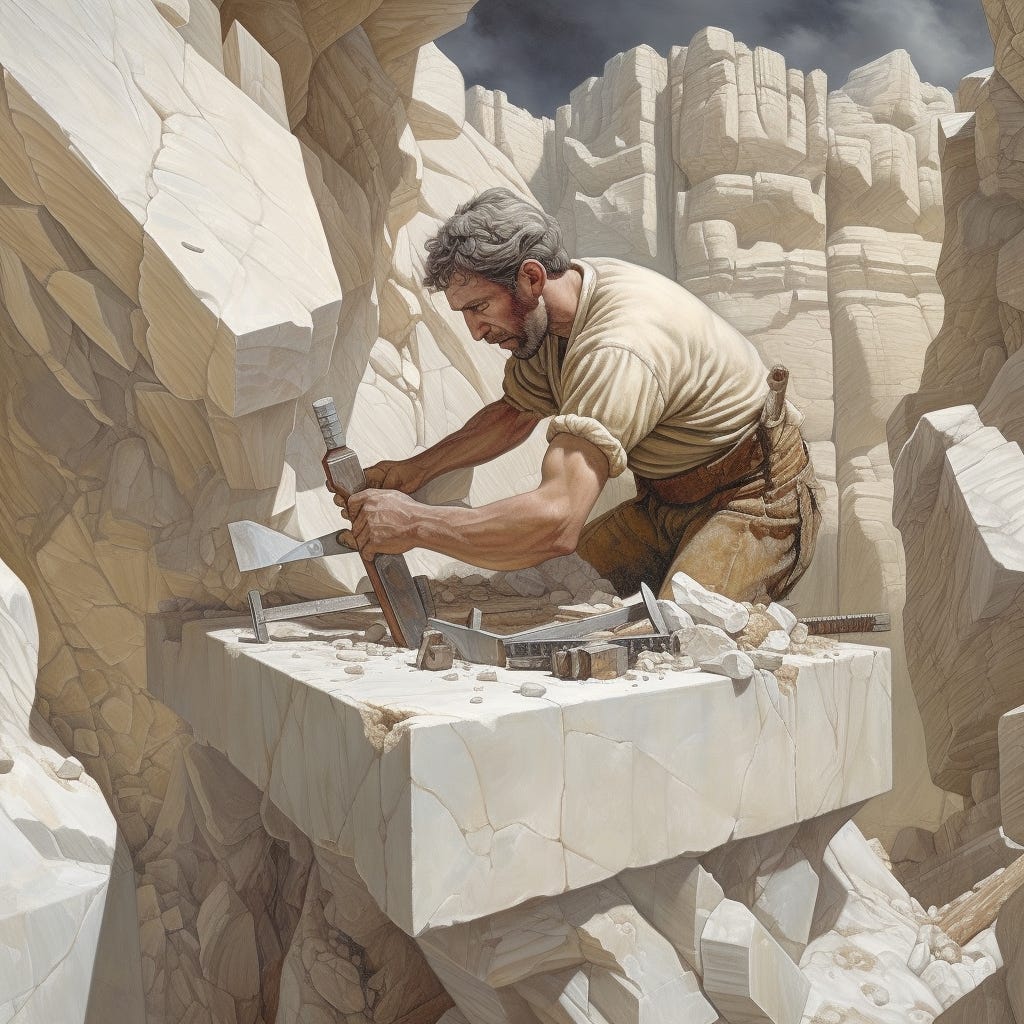
The others watched him work, day in and day out, as he lay the stones, repeating his labor each time they were tampered with by the dread spirit. No one stopped him nor aided him. They stayed clear of him and let him toil away at the edge of the village, haunted as he was.
And, as the twisted form of his son bent its full attention on Cogidubnus, the sickness slowly seeped away from the rest of the settlement.
Yet the dread disease would not leave Kelindey. The weight of the stones Cogidubnus carried was nothing to the weight upon his heart as his daughter grew sicker with each new stone laid. Her already diminished form grew even more so, and her skin went from pale and sickly to an unnatural gray as the dark splotches spread and connected. Her breathing became ever-more labored and ragged, as if her lungs could not fully fill with air.
But still Cogidubnus laid the stones, despite setback after setback, and with each stone it seemed to weaken his son’s power ever so slightly. They were in strange battle, now.
The walls rose in Cogidubnus’s wake, and the village grew up atop the foundations he laid. Slowly but surely, buildings sprouted up within the walls, streets, and alleys formed between them. Paths were cut, and roads were paved.
Cogidubnus bore the weight of the settlement on his shoulders. As he worked, the rest of the settlers saw he was somehow keeping the dark force at bay by holding its focus on him and his child. Still, they feared the Uncanny stranger would return its gaze to the settlement at large if they helped. So they watched, leaving small gestures of food and supplies when they could.
As the city’s borders grew, a new task arose to find the Stonelayer, as Cogidubnus came to be known, and the people of the village would trek around the perimeter with their bundles of food and water or fresh tools. Occasionally, they would glimpse the shadow that followed the Stonelayer; when they did, they would set their offerings upon his piles of uncut stones.
As this practice continued, Cogidubnus began to leave his broken or chipped tools on the stone piles as a trade of sorts. The pilgrims would take the broken tools back with them, and it became part of the journey to repair or service them so they could provide the builder with fresh tools for the foundational stones he laid each day.
Yet even as the foundations were laid and the town grew, Drej was unmoved. He watched the stooped back of Cogidubnus under the hot sun and spat in the dust.
“Mad Cog is playing a trick on us,” he proclaimed. “The curse will return, just you watch!”
At first, people chuckled or nodded in agreement. Eventually, they avoided Drej and his bitterness.
⚙︎⚙︎⚙︎
The day the last stone of the binding was laid was one of great terror. The sky grew dark, the world shook, and shadows swirled and gathered in all corners of the settlement. Only that same unnamed chronicler who walked beside Cogidubnus in the desert saw the final conflict between the Stonelayer and the being that stalked him.
Cogidubnus the Stonelayer wove between columns, carrying a small bundle in his arms toward the center of the unfinished foundation, comforting it with soft words. In the center of the foundation, a single stone column with beautiful swirling striations across its surface stood alone, jutting from the ground, reaching for a ceiling that had not yet been built.
Cogidubnus stood next to the column and waited. A figure slithered from the darkness, bringing all the shadows with it as it approached the Stonelayer. Its head fell at an unnatural angle, and its eyes glowed with white fire.
“My son,” Cogidubnus said as tears welled in his eyes, “you deserved better. Take this offering, my Vagabond Prince, that this growing city may survive.”
He held the bundle toward the shadow. As the Vagabond Prince reached out, its cold fingers almost brushing the bundle, the Stonelayer, with a mighty kick, struck the base of the column. A rope snapped, a pulley spun, and a stone fell from a crane overhead. It stabbed into the soft earth like the massive spear of a giant, completing the base of the building’s foundation.
The moment the stone fell, the striations across all the columns and the walls glowed with a purple light in a singular pulse. As the light grew, the shadows receded, seemingly pulled toward the center of the foundation.
The Uncanny thing turned about in fury and confusion, screeching as its form was pulled toward the central column. Though it struggled, it melted into the stone, stretching and pulling between all the columns at once before fading entirely.
With it went the sickness upon Cogidbunus’s daughter and the rot that threatened the settlement. Even the air seemed suddenly sweeter.
In the weeks and months that followed, the people built the city properly without further setbacks. All the while, Cogidubnus’s foundations held strong.
Though sealed away with weakened powers, the Vagabond Prince still stretches his influence throughout the world, drawing threats to Amalcross.
Some claim Drej’s spit which smeared the parchment’s fresh ink introduced a small error into the shape of the binding glyph. Others believe the Rilk’gar were drawn to war by the Vagabond Prince’s strange allure in a desperate bid to escape. Still others say the Vagabond Prince laid his influence upon the Kings of Mard and encouraged the sack of the city for this same purpose.
If they are to be believed, the only obstacle between us and utter ruin are the great stones laid by King Cogidubnus, the First and Only.
⚙︎⚙︎⚙︎
Lerman Garindis, draped in robes and a fine cap with a gold tassel, taps his finger impatiently on the polished wooden lectern before him. A smattering of applause issues from those gathered in the Hall.
Garindis speaks once more, his stentorian voice gaining strength.
“We all know the tales of Cogidubnus and the founding of our metropolis here,” he said. “He was ‘husband to none,’ or so the legend goes. I say those legends are little more than piffle! In my own research, forthcoming in essays published by the Amalcross Daily and which I have summarized for you here today, I found he was married long before he came to the place that would become our fair City of Amalcross. I have also discovered that our founder had a son, of sorts. I know, I know, you don’t believe it. But I assure you the legendary Uncanny Being, the Vagabond Prince, is his son!”
A guffaw echoed from the back of the room, and Garindis narrowed his eyes.
“I believe this being is the son of Cogidubnus,” he continued, “twisted from its earthly form by the forces of Order and Chaos, Death and Life, into something else.Our city has most often known peace, but those who know this secret history believe the Vagabond Prince is merely biding his time, gathering his power. If the bindings laid deep in our city’s bones were to fail, there is no telling what he could or would do.”
“How drunk were you when you made this up?” The voice echoed from the depths of the lecture hall.
Garindis slammed shut his leather-bound book, shouting as he stalked from the stage.
“You can all read more of these mysterious theories and deeper legends surrounding our founder’s origin in my book Secrets of the Stonelayer: Theories and Legends Surrounding the Founding of Amalcross, on sale now at the Brass Spine! This was just a taste of what I have in store for my readers in this collection of essays. Buy it if you want to know the truth!”
